#but i personally think its a shame so many people miss that in cf =(
Text
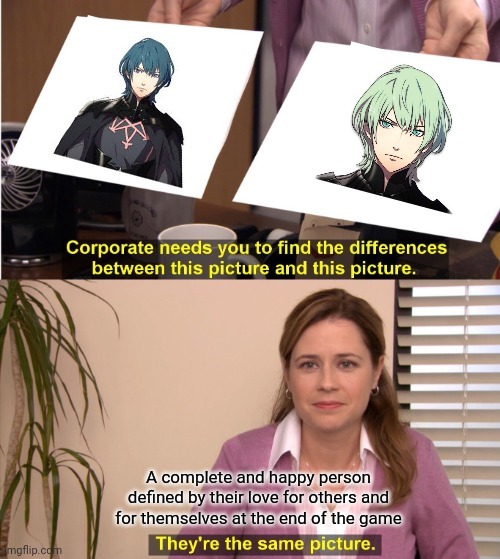
Byleth is not defined by their OP powers and I will die on this hill
#fe3h#fe16#byleth eisner#crimson flower#silver snow#azure moon#verdant wind#byleth discourse#edelgard discourse#kinda i'm not sure#byleth#byleth embraces who they are in every route and that's the point#but that changes with their experiences and that is beautiful not something to blame themselves for#anyways you can think what you want in the end and i won't judge you ofc#but i personally think its a shame so many people miss that in cf =(#byleth positive#is this tag a thing ??#i mean i myself always feel a bit uneasy about them becoming the archbishop because it's a bit like becoming what rhea wanted them to be#but if i can accept that#i think others can accept that cf is not a bad route for byleth either
52 notes
·
View notes
Text
Since its 3Hs anniversary some really cool things I like about the game that aren’t talked about enough because the fandom is too busy arguing who is right and who is wrong
The worldbuilding just. 3H has honestly one of my favorite fictional settings. Its just both expansive but also genuinely interesting. I have spent HOURS thinking about the world and made so many ocs its not even funny. I love thinking about the setting of the game so much.
I LOVE the puzzle like way the game explains its world and story. Like I know some people don’t like it because it makes the game a bit too convoluted but personally? I LOVE 3Hs way of not telling everything but rather giving hints and clues the player has to piece themselves. It makes the games world feel more interactive and feels so satisfying. Then again I enjoy that kind of approach to worldbuilding
In general I love 3hs fragmented story and the way how the story is placed in many different fragments. It is geniunely rewarding to replay the game from another storypath and notice the foreshadowing Would’ve the story been probably better had it been just one storypath? Honestly yes. But 3h is ambitious and one of the ways it is is with its fragmented story structure.
The structure of White Clouds is criminally underrated honestly and gets way more hate than it deserves. I love how the first few chapters set up the world of Fodlan and show injustices/conflicts of the world with chapters like the chapter where you face off Lonato for instance. Then the next few chapters are spend in deepening the mysteries such as the conspiracy against the church and the mystery regarding TWSITD. Then Jeralt dies and the last few chapters are spent as “beginning of the End” so to speak, as things clears to the intense climax.
On related note I LOVE how the game handles perspective and how the lords are the respective ways we view the story. I know so many people say “WHite Clouds is same on all paths” but I do feel that’s kinda the point. The story is the same but there are differences that come from the way each of the lords is strongly characterized and has different values, worldviews. The subtle changes on what are focused on in each route also foreshadow what will be focused on each route, which I think is super cool.
Even beyond the lords and routes the game does explore the idea of perspective well. I do think 3h has this very “everyone is the hero of their own story” type of approach to perspective and it shows it well. Each character believes they’re in the right and you can get this view that they view themselves as right. Even Agarthans who are the designated villains have this sense they think they’re in right and that the Nabateans were evil.
The way how games routes being divided into having a different focus is very cool. I love how AM is a smaller scale personal tragedy, how CF is a battle of ideals and how VW explores the world and reveals deeper mysteries. I also love how all of these are related to the lords ideals and worldviews: Dimitri is the most conflicted of the lords so he gets the most characterfocused story focused on . Edelgard is the most ideologically driven so her path focuses on her ideals and battle of wills against Rhea. Claude is the one who is the most freespirited and wants to know the truth so his route focuses on revealing the mysteries.
Also the way the houses characters reflect their respective routes storyline and central themes: Black Eagles are nobles that have conflicting relationships with nobility reflecting Edelgards goal, Blue Lions are all united with the trauma of Tragedy of Duscur, and Golden Deer are a house of misfits who give this “ragtag group who will save the universe with POWER OF FRIENDSHIP and this cool gun I found” vibes which fit the route PERFECTLY
I LOVE how the game plays with and subverts a lot of Fire Emblem tropes. While it does play some tropes straight (dad death and evil cult manipulating behind the scenes) it does do a lot to break from series conventions and playing with ideas to make a more ambitious story. The way it either subverts expectations (The evil emperor being female well intended extremist, Rhea being the Gharnef/Medeus instead of the Nyna archetype she’s presented as), twists familiar tropes to their natural extreme (Dimitris arc is basically the natural extreme end of stereotypical FE lord) and other similar things make the game feeling so planned out, like the writers understood FE stories and wanted to make something that challenges FE while still feeling like it.
The way how every major player acts as foil/pararell to another player is so GOOD. Every faction leader can be compared to the other somehow and that just makes the game SOOOO fun to analyze, trying to find all the similarities and differences and pararells is so rewarding.
A more specific example on this is how i love how the game plays with the idea of holy/sacred weapons. While normally these weapons are artifacts from goddess that defeat dragons, here the holy weapons are bones made from dragons and just???? HOW METAL IS THAT????????? It’s just such a neat way to subvert the idea of sacred weapons. Rather than being blessed creations of the goddess, they are weapons of destruction made by the villains.
I ADORE THE GAMES science fiction elements. I know people say they feel out of place but personally, they make the game memorable for me. I still remember the first time I saw that scene with nukes. I especially love the heavy implication that Sothis isn’t a goddess but rather a powerful alien. It makes her character much more interesting
I know a lot of people don’t like Agarthans but can I just say their backstory being “forced to hide after their land got conquered and desiring it back” making them a dark mirror not just 3h lords/Rhea but FE lords as whole is SO FUCKING METAL. This is what I mean with 3H writers knowing their tropes like back of their hand.
I love how in Part 1 sometimes you’d talk to two characters in Monastery at once instead of just one. It’s something I miss in part 2 honestly.
I love the small sidequests such as the fishing tourney and White Heron cup and wish Part 1 had more of them, it would’ve made the school part feel more alive.
I LOVE how some missions (esp paralogues) have subgoals that you can clear to get better rewards. I wish the game had been more clear with them or even made them main goals of maps sometimes.
I LOVE THE WAY Paralogues act as small gaiden stories that show more of the games world and characters. Its a neat way to let the sidecharacters shine and reveal some neat secrets of the games world and story.
The gameplay loop is honetly fun and satisfying. It is rewarding and while it gets tiring towards the end overall its a good gameplay loop.
I ADORE the aesthetic of Shambhala. Its just so sleek and sinister. The cyrillic letters spelling different words is so cool. Shambhala is my favorite map in the game and the aesthetic is a big reason why.
The games soundtrack is so good!!!!!!!!!! But not only that I LOVE the way its electro elements subtly hint of Agarthans being in control behind the scenes. This is especially cool in Road to Dominion where the electro parts are barely noticeable yet present. but other tracks have subtle electro vibes as well.�� The other way the games music tells the story (such as use of leitmotifs or how the monastery music changes once Jeralt dies) is great as well.
I love how 3h can be read as an allegory for reformation era and reneissance. Its such an interesting way to read the games events and compare it to a real historical periods there’s quite a bit of f
In general I ADORE the cultural references of the game. There’s surprisingly lot of way the games world is based on real life and the details are just *chefs kiss*
THE GAME IS DENSE WITH THEMATIC IDEAS. Besides the perspective the game tackles ideas of how trauma can affect a persons psyche and worldview (as well how a persons trauma affects the way they interact with the world which in turn can affect the world as well), grief, societal values, historical revisiniosm and so much more. The game tackles SO MANY topics in an interesting manner, it is thematically just as dense as it is storywise as well.
I also love how the games thematic parts work in harmony with the story rather than one overshadowing with the other. Its super refreshing honestly where a games themes and story are both rich and I don’t have to pick one over the other.
Lastly I ADORE the games central message (or at least what I see as the central message anyway): The world’s fucked up and most people want to fix it, but what they deem fixing differs and because of that they go into conflict or outright war rather than trying to find a common ground. Everyone wants a better world but no one can agree what a better world truly means so they fight over it. It was a theme that not only resonates with my personal values but also hit me REALLY hard when I first played it as it’s a theme that I found incredibly relevant and reflective of our own world during the time I played the game for the first time.
So yeah. I made this post since there’s SO MUCH neat things about the game, its gameplay and story that sadly get swept under the rug in favor of either arguing which lord was right/wrong or complaining how the game is an unfinished, rushed and overambitious mess. Is 3h perfect? Hell no. But it’s a game that I hold near and dear to my heart and does genuinely SO MANY THINGS RIGHT, I’m sad no one talks about the genuine strengths the game has anymore, instead just complaining.
I’m not even joking when I say that 3h should be up there as heralded as one of the best, most ambitious and complex JRPGs alongside Xenogears, the first Xenoblade game, Suikoden and Trails series as whole along other such games. Its a shame the games reputation is less like those games and more like Persona 5s where everyone focuses more on its flaws and the fans being annoying than the fact the game does geniunely A LOT right. It’s just that good, ambitious game I love so much.
35 notes
·
View notes
Text
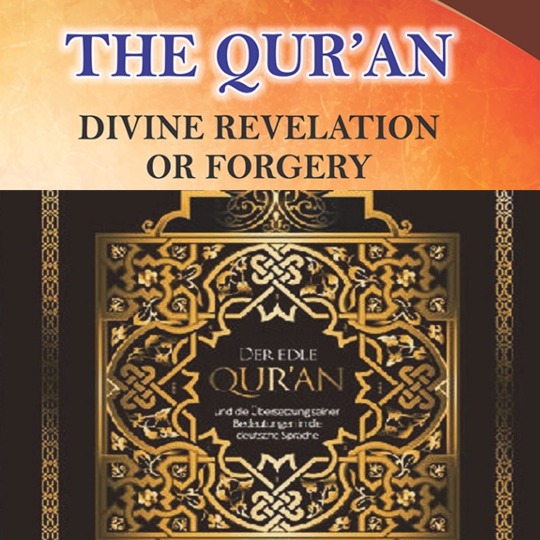
The Quran: Revelation or Forgery?
By Goodreads Author Eli Kittim
——-
Did Muhammad Exist?
Before we embark on a brief criticism of the Quran, it’s important to note that there is “very little biographical information” (Wiki) concerning the historicity of its founder, Muhammad:
Attempts to distinguish between the
historical elements and the unhistorical
elements of many of the reports of
Muhammad have not been very successful
(Wiki).
(see: https://en.m.wikipedia.org/wiki/Historicity_of_Muhammad#Views_of_secular_historians).
Of course, this opens up the possibility of whether or not the unknown author of the Quran invented the Muhammad tradition to bolster his credibility. In order to determine the answer to this question, it is crucial to consider the evidence of *intertextuality* in the Quran, that is to say, the literary dependence of the Quran on earlier texts and sources.
——-
How historically reliable is the Quran?
Firstly, with regard to source criticism——that is, the sources that the Quran’s message is derived from——there are some very serious issues involved. For example, there are well-known parallelisms between the Quran and the extra-biblical, non-inspired book of Talmud (e.g. Surah 5:32; cf. Sanhedrin 37a) as well as borrowing from Christian apocryphal works that were written hundreds of years after the purported events and which claim to be legitimate Christian gospels but are not. Case in point, The Infancy Gospel of Thomas:
The Infancy Gospel of Thomas is thought to
be Gnostic in origin. . . . Early Christians
regarded the Infancy Gospel of Thomas as
inauthentic and heretical. Hippolytus
identified it as a fake and a heresy in his
Refutation of All Heresies, and his
contemporary Origen referred to it in a
similar way in a homily written in the early
third century. Eusebius rejected it as a
heretical ‘fiction’ in the third book of his
fourth-century Church History, and Pope
Gelasius I included it in his list of heretical
books in the fifth century. While non-
canonical in Christianity, the Infancy Gospel
of Thomas contains many miracles and
stories of Jesus referenced in the Qur'an,
such as Jesus giving life to clay birds (Wiki).
So, the Quran clearly employs Jewish and Christian apocryphal works that were never accepted as canonical or as “inspired” either by Jews or Christians. Thus, at least some of the sources of the Quran are highly dubious.
Secondly, in 632 CE, following Muhammad’s death, the Battle of Yamama ensued where a great number of those who had supposedly retained the Quran in their memory (hafiz) actually died. How then can Muslims claim the preservation of the Quran through memory and oral transmission?
Thirdly, the New Testament is the best attested book from the ancient world as well as the most scrutinized book in history, and one which has a critical edition. By contrast, the Quran has not been critically scrutinized rigorously in the same manner, nor does it have a critical edition, nor is the manuscript evidence made available to scholars for serious study. There’s a secrecy surrounding it that seems to prevent scholarly investigations. For example, because it lacks a critical edition, there are no footnotes in the Quran to notify the reader about manuscript evidence or textual discrepancies or omissions, such that “(some verses eaten by a goat; Ibn Majah, Book of Nikah, p.39) or that (Umar records the missing verses; Bukhari 8.82.816 & 817).
Fourthly, Orientalists have often questioned the historical authenticity of the Quran by charging Uthman ibn Affan (the 3rd Caliph of Islam) of consigning variant copies of the Quran to the flames during his reign.
Fifthly, the controlled transmission of the Quran makes it impossible to know what was the original. Hence its textual integrity is seriously compromised. By contrast, in the case of the New Testament, for example, since no one person controlled all the manuscripts, it would be impossible to uniformly corrupt all the documents. In the case of the Quran, however, the text was in fact controlled by one person, the khalifa, as attested by Uthman's authority to recall and uniformly revise all the manuscripts. Therefore, it would have been extremely easy for the Quran to have been uniformly corrupted in a textually undetectable manner. For example, the “Sanaa manuscript,” which contains earlier developments of the Quran, demonstrates textual variances that diverge from the Uthman copy.
In conclusion, the Quran doesn’t allow us to come any closer to the original text than the Uthmanic Revised Standard Version 20 years removed from Muhammad. Any errors which found their way into the URSV would be permanent and uncorrectable. And, unfortunately, historical accounts from early Islam tell us that such errors existed!
——-
The Quran is Based on Dubious Sources
Besides the numerous and traceable Judeo-Christian apocryphal works that the author used within the Quran itself, he also got a lot of his ideas from a group that was an offshoot of the Ebionites called the “Sabians,” variously known as Mandaeans or Elcesaites. The Sabians followed Hermeticism and adored John the Baptizer:
Occasionally,
Mandaeans are called
‘Christians of Saint
John’ . . . the ‘Sabians’
are described several
times in the Quran as
People of the Book,
alongside Jews and
Christians (Wiki).
According to Origen and Eusebius, the Sabians used an extra-biblical book that they claimed was given by an Angel (maybe another idea adopted by Muhammad?) to deny portions of Scripture as well as the writings of Paul! So, this idea of challenging Christianity and claiming to have received a new revelation from an angel is quite common in ancient times. It is not unique to Islam. Others had made similar claims. Thus, without completely rejecting the possibility of *revelation* in at least some portions of the Quran, the majority of its theological narratives are largely based on dubious and questionable sources, derived from spurious texts that were under the radar of heresiologists across the ancient world!
——-
Two Apocryphal Works Employed by the Quran to Deny the Crucifixion of Jesus
//Second Treatise of the Great Seth is an apocryphal Gnostic writing discovered in the Codex VII of the Nag Hammadi codices and dates to around the third century. The author is unknown, and the Seth referenced in the title appears nowhere in the text. Instead Seth is thought to reference the third son of Adam and Eve to whom gnosis was first revealed, according to some gnostics. The author appears to belong to a group of gnostics who maintain that Jesus Christ was not crucified on the cross. Instead the text says that Simon of Cyrene was mistaken for Jesus and crucified in his place. Jesus is described as standing by and "laughing at their ignorance”// (Wiki).
//The Gnostic Apocalypse of Peter is a text found amongst the Nag Hammadi library, and part of the New Testament apocrypha. Like the vast majority of texts in the Nag Hammadi collection, it is heavily gnostic. It was probably written around 100-200 AD. Since the only known copy is written in Coptic, it is also known as the Coptic Apocalypse of Peter.
The text takes gnostic interpretations of the crucifixion to the extreme, picturing Jesus as laughing and warning against people who cleave to the name of a dead man, thinking they shall become pure. Like some of the rarer Gnostic writings, this one also doubts the established Crucifixion story which places Jesus on the cross. Instead, according to this text, there was a substitute:
He whom you saw on the
tree, glad and laughing,
this is the living Jesus.
But this one into whose
hands and feet they
drive the nails is his
fleshly part, which is the
substitute being put to
shame, the one who
came into being in his
likeness. But look at him
and me// (Wiki).
This is attested in the Quran:
That they said (in boast), ‘We killed Christ
Jesus the son of Mary, the Messenger of
Allah’—but they killed him not, nor crucified
him, but so it was made to appear to them,
and those who differ therein are full of
doubts, with no [certain] knowledge, but
only conjecture to follow, for of a surety they
killed him not—nay, Allah raised him up unto
Himself; and Allah is Exalted in Power,
Wise (Sura 4:157-158, Yusuf Ali).
——-
A Possible Forgery: Is Muhammad Copying Augustine?
Muhammad (570 – 632 CE) seems to have modelled his conversion on Augustine of Hippo (354 – 430 CE), who was without a doubt the greatest theologian and philosopher of his day! Case in point, in 386 CE, Augustine converted to Christianity from the pagan Machanean religion. Similarly, in 610 CE, Muhammad converted to Islam from the “Jahiliyya" religion, which worshipped Allah as the creator god as well as the Kaaba in Mecca. About 224 years earlier St. Augustine had heard a voice that told him to “take up and read,” a line which became very famous and reverberated through the centuries:
As Augustine later told it, his conversion
was prompted by hearing a child's voice
say ‘take up and read’ (Latin: tolle, lege).
Resorting to the Sortes Sanctorum, he
opened a book of St. Paul's writings (codex
apostoli, 8.12.29) at random and read
Romans 13: 13–14: Not in rioting and
drunkenness, not in chambering and
wantonness, not in strife and envying, but
put on the Lord Jesus Christ, and make no
provision for the flesh to fulfill the lusts
thereof (Wiki).
By comparison, Muhammad appears to have used a similar line to claim that he, too, heard an Angel’s voice repeatedly say to him: “Read.” Given that Muhammad was presumably familiar with Judaism and Christianity (and especially with the foremost leading authority of his day, the African Augustine of Hippo), it seems very likely that he modelled his conversion on the latter. And, if true, that would certainly constitute a forgery!
——-
Are Allah’s Oaths Self-contradictory in the Quran?
The aforementioned textual criticisms are further compounded when we realize that the Quran contains further theological discrepancies. For example, there are numerous verses in the Quran where Allah is swearing by created things that are less-than-God, thus committing “shirk” (i.e. the sin of ascribing divine status to any other beings beside Allah). Here’s a case in point. In sura 81:15, Allah says: “But nay! I swear by the stars.” Another example is sura 91 verse 1: “I swear by the sun and its brilliance.” When God supposedly swears by something which is less than himself the truth value of his assertion is obviously weakened. By definition, an oath is meant to buttress an argument, not to decrease the weight thereof. Therefore, the truth value of an oath is equivalent to, and connected with, the truth value of the one who declares it. As such, Allah’s oaths (swearing by created things) directly contradict his so-called divine status. By contrast, the God of the Bible swears by Himself, since there is nothing greater to swear under (cf. Gen. 22.16; Isa. 45.23; Heb. 6.13). By definition, an oath is a solemn attestation of the truth of one's words. In this case, how can Allah’s oaths be trustworthy if they appeal to something that is less than himself? Answer: they cannot! It appears, then, that the aforementioned oaths in the Quran are reflecting a human rather than a divine author.
——-
Is Muhammad the Prophesied False Prophet of Revelation?
During the Early Middle
Ages, Christendom
largely viewed Islam as a
Christological heresy
and Muhammad as a
false prophet (Wiki).
In short, following the Arab conquest of the Middle East and due to the *military expansion* of Islam into Europe and Central Asia since the 700’s (toppling one country after another), Muhammad was increasingly seen as a possible candidate for the office of the *false-prophet-of-Revelation* (cf. Rev. 16.13; 19.20; 20.10): https://en.m.wikipedia.org/wiki/Medieval_Christian_views_on_Muhammad
——-
Conclusion
Muslims claim that the Quran is neither corrupted nor influenced by Judeo-Christian sources, and yet upon further scrutiny the book clearly incorporates passages from both the Jewish Talmud and from various Christian apocryphal works. Plagiarism abounds, and so does forgery. Therefore, it is extremely difficult, if not impossible, to maintain that it’s a “revelation” when at least some of the sources of the Quran are highly dubious!
Moreover, Islam has nothing new to offer by way of revelation. Its doctrine could simply be classified as a modified theological redundancy of the Judeo-Christian tradition and the Biblical heritage that preceded it. The main difference between Islam and Christianity is this. Unlike the Quran’s singular witness and source——given that it was only revealed to *one* man (Muhammad)——the revelations of the New Testament were imparted to many different people, thereby authenticating its message by multiple attestations and witnesses!
——-
#muhammad#talmud#the infancy gospel of Thomas#intertextuality#Battle of Yamama#hafiz#Umar#Bukhari#Uthman ibn Affan#Uthmanic Revised Standard Version#Sabians#Second Treatise of the Great Seth#The Gnostic Apocalypse of Peter#Surah 4:157-158#quran#Yusuf Ali#augustine of hippo#allah#false prophet of Revelation#plagiarism#forgery#Sanaa manuscript#apocrypha#gnostic#source criticism#historical reliability of the Quran#islam#eli Kittim#christian apologetics#textual criticism
4 notes
·
View notes
Text
A Glimpse of Another Kind of Economy

Recently in a post about consumerism—The Problem of Consumerism—I touched upon the economics of consumerism and I suggested that, since all advanced industrialized economies are based on consumerism, with consumer products, consumer spending, and consumer debt playing a large role in the economy, we don’t even know what a modern non-consumerist economy would look like. Because of recent shutdowns of large swathes of the economies of advanced industrialized nation-states due to the COVID-19 panic, we have been granted a glimpse of a very different kind of economy, and the different kinds of behaviors to be observed in different economic circumstances.
As offices shut their doors and sent workers away to work from home, and then an increasing number of business ceased most of their operations, laying off workers, and children were sent home from school, people found themselves forcibly idled. In Oregon, we had some beautifully sunny early spring days, and people were out in droves, walking their dogs and engaging in family recreation. I have never before seen so many happy children and happy dogs, innocent of why their family is not away at work but is instead home and available. The previous weekend the weather was particularly nice, and large numbers of people left the city to go to the coast. Local mullet-wrapper Willamette Week had this to say:
“After throngs of visitors flocked to trails and beaches this weekend despite Brown’s repeated calls for residents to stay at home, the entire Oregon State Parks system is closing to the public. Same goes for Multnomah Falls. The northern Oregon Coast has closed its hotels, and the town of Seaside closed its beach.”
This kind of unintended recreation is not only happening in Oregon. Youtuber Carl Benjamin made a video about this, Coronavirus is Giving Everyone What They Wanted, making similar observations about England.
The shutdowns that have been effected specifically exempt essential industries. That means that, despite the panic buying, store shelves are being regularly re-stocked. Food is plentiful; the agricultural industry has not been shut down, nor the transportation industry that moves goods from farms to grocery stores. Utilities continue to function, so that electricity, communications, water, and sewer are working. If there were hunger or blackouts, people would become restive, and eventually they would riot, but they have enough to eat, they have hot showers and clean clothes, and they have the internet to supply them with news and entertainment. You can even get take out from your favorite restaurant, though you have to eat it at home.
Homelife, then, long neglected by the gradual growth of institutions utterly indifferent to it, is flourishing. The primary goal of the shutdowns is the curtailment of social gatherings, which could speed the spread of COVID-19. With social gatherings curtailed, only homelife remains.
Cities are visibly quiet, as can be seen in satellite photographs: Coronavirus slowdown in US seen from space. A photograph was circulating on social media of mountain lions prowling a suburb in Denver, so quiet had it become that, with the retreat of human beings, nature and the wild return with astonishing rapidity. The curtailment of industry has had unintended effects of mitigating pollution. Photographs have shown the water in the canals of Venice running clear, and the return of swans (cf. Venice canals are crystal clear after coronavirus lockdown in Italy by Hannah Sparks).
Some of the observations of pollution mitigation have taken an angry turn by saying, “Humans are the disease, coronavirus is the cure” and variations thereof. This has, in turn, already inspired a backlash calling these observations “misanthropic.” Some of them certainly are, but to dismiss the obvious evidence that shutting down non-essential industries makes the planet noticeably cleaner within days is to completely miss the point. It is possible for seven billion human beings to live on Earth and also to have clear skies, clean water, and wildlife. These are not misanthropic observations; on the contrary, human life is, or would be, greatly improved by a planet with dependably clear skies, clean water, and wildlife.
What the COVID-19 shut downs have done, unintentionally, is to give us a glimpse of an entirely different kind of economy in which essential services continue to function, but the bloat of consumerism is cut down to its proper size. Ultimately, we do not want to curtail social gatherings, and we do not want to close down state parks and public beaches. We want social gatherings to flourish, and for natural places to be open to the public for all to enjoy, and we can have these things once again after the pandemic has run its course. We can re-open restaurants, allow parties and concerts to proceed, and see social life return to normal. Everyone wants this, and we all understand that it will take time. But will we have learned the unintended lesson of shutting down the greater part of the non-essential economy?
There is already a significant amount of speculation on how the COVID-19 panic will influence life in the future, that changes put in place during the pandemic will lead to a “new normal,” and that things will never be exactly the same again. The convergence of social distancing, working from home, and technologically-enabled isolation could issue in a nightmarish dystopia in which the curtailment of social gatherings becomes institutionalized, to the detriment of us all (cf. Why social distancing might last for some time by Abigail Beall). On the other hand, we might also learn the lesson that most people who work in an office do not need to commute to an office building every day, diverting a large part of the economy into personal transportation and consuming enormous quantities of gasoline, that remote work and remote learning can be effective, and that alternative arrangements are possible and, in some cases, preferable.
For my part, the lesson I hope will be learned from the great pandemic of 2020 (though I don’t think it at all likely) is that there is the possibility of an economy in technologically advanced nation-states in which we can maintain essential industries even while minimizing if not shaming the industries of consumerism, but in which the blandishments of consumerism will not be missed because family life and social life are enjoyed in the context of cleaner, quieter cities and natural spaces in which wildlife thrives. Before the great shut down, we didn’t really know what this would look like; now we do. Shutting down the consumer-driven economy would be a win-win for both humanity and our homeworld.

25 notes
·
View notes
Note
Well this week's ily episode had quite a few interesting things going on and of course I want to know your thoughts about the episode.
Yo!
Yeong-Gi and Shin-Ae’s dialog:
I was already intrigued by what Yeong-Gi said last week, and frankly, I’m still wondering about his true motivations for making Shin-Ae invite Kousuke to the party. As much as YG is the type of guy who’d think about others’ well-being, even if it’s his brother whom he doesn’t get along with, something’s bothering me with the way he expressed it (maybe because of the imperative form?), or how incongruous I personally found it, despite the hypotheses I proposed last week. Consequently, I remain doubtful, and I do find Shin-Ae’s doubts legitimate too (to a certain extent at least, since I don’t think YG wants to “mess with [Kousuke]” for example).
Shin-Ae and Kousuke’s dialog:
I’m… well… you know what I’m going to say, right? Who. The. Hell. Does. Kousuke. Think. He. Is? First of all, there’s no way a boss is allowed to pressure an employee to reveal their personal issues, especially using such a manipulative technique:
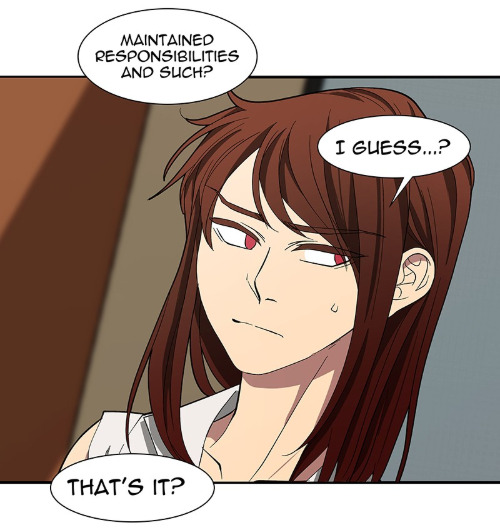
“That’s it?” Are you kidding me? But Mr. “I’m entitled and proud” isn’t done, you see?
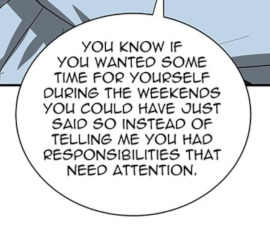
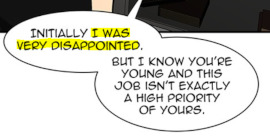
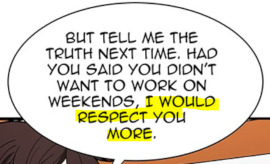
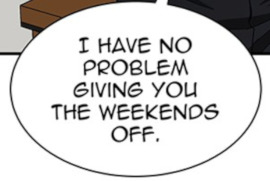
Doesn’t this sound familiar? I expressed it many times back when Shin-Ae was at the hospital (and for which K stans harassed me because what else ofc): dude, it’s not about you, ffs. It’s a recurring pattern Quimchee has integrated into Kousuke’s way of speaking, especially when it comes to Shin-Ae: he’s often bringing things “back” to himself, even though they’ve got nothing to do with him. And this so, so inappropriate. There’s a reason why I put these four screenshots together, even if some seem innocent: Kousuke is trying to make Shin-Ae feel guilty over 1) something he has no proof of—her so-called lie, as well as her so-called lack of motivation (look how condescending he is ugh)—, 2) something that hurt his ego (”I would respect you more”—again, who cares? it’s not supposed to be about you), and 3) something that is completely, absolutely, ridiculous. I’d like Kousuke to tell me something: does he, himself, has a doppelgänger who works on Sundays while he can to the amusement park, or does he only expects “Miss Yoo” to work seven days a week? Hello dude, you saw her on a f*cking Sunday, while you weren’t even working yourself, so please shut it. It’s even more manipulative when you realize that he keeps on repeating “weekends” instead of “Sunday(s)”, and isn’t considering, for one second, that an individual can do several things on the same day/weekend. About that, this is what tops it all for me:
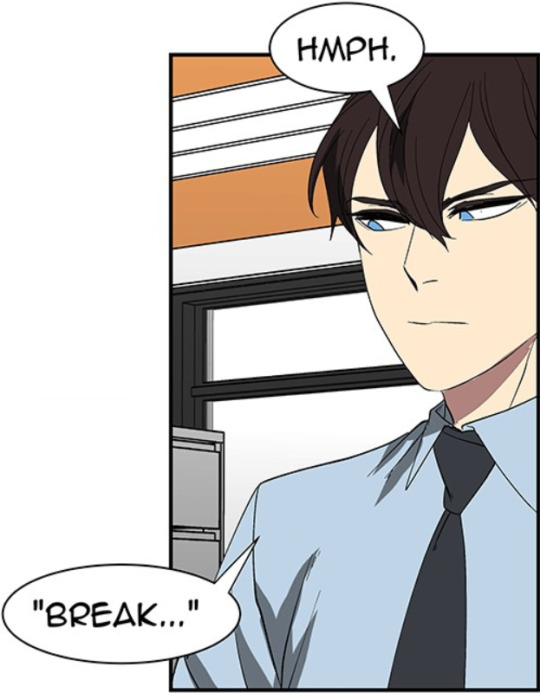
IS THIS A F*CKING JOKE?! Is he seriously disregarding Shin-Ae’s need for a break? This is so, so low of him. It’s like he expects Shin-Ae’s life to revolve around him and his expectations for her (cf. what he told Yeong-Gi too).
Anyway… it’s sad that Shin-Ae had to justify herself like this. I insist: despite what you can assume from popular representations associated with superiors in the workplace (or from how your sh*tty manager is acting towards you), Kousuke’s behavior, as a person AND as a boss, is clearly out of line. It’s no wonder Shin-Ae looks miserable working for him.
You can think I’m harsh with Kousuke, but he doesn’t deserve excuses for his terrible attitude in my opinion, especially because it isn’t the first time it happens (and even if it was…). I don’t care whether he isn’t aware of how rude he sounds, or whether he really believes what he’s saying (which I mention below), none of this justifies anything. End of discussion.
Rand and Shin-Ae’s dialog:
I have more things to react to so let’s make a list:
- Oh… Rand sings… Imagine if it’s the same song Yeong-Gi hums…
- Yes, Rand is too old for Shin-Ae, and yes, he’s a terrible person, morally speaking. But Shin-Ae’s crush on him is so freaking hilarious to me that I don’t really want it to disappear anytime soon :D (and Shin-Ae saying “hot and bothered” is just azsdfghjkl)
- (I’m sorry but nobody likes black licorice)
- Shin-Ae being so bold and defending Yeong-Gi is just?? so?? powerful?? Both care about each other so much despite having met 2.5 months ago and it makes me cry.
- I though Yeong-Gi was in trouble, so I must’ve missed something… Or Rand is just trying to “spare” Shin-Ae? To avoid her getting afraid and taking the risk to make the deal more difficult than it should be?
- This line. I still think Rand is somewhat of a hypocrite, but he’s a mysterious guy as well, so he could very well be playing several roles at the same time, if you know what I mean.
- Why didn’t Rand say “Not even the other Hiraharas”? Does he not include himself in the Hirahara family? (look, I have a theory about this here!) Or does he assume Shin-Ae didn’t understand who he was?
- Yeah… hm… sorry, but I’m not 100% sure who Rand’s talking about at the end. Depending of how one understands it, it could be several people possibly taking advantage of SA. What’s y’all’s opinion?
- Of course, I don’t know the extent of what Rand told Shin-Ae about Yeong-Gi’s situation, but guessing from both their demeanor, I think Rand trusts Shin-Ae enough to explain (almost?) everything to her. But again, we (and Shin-Ae) know that Rand’s not a completely honest person… As for whether Shin-Ae is genuinely ready to help Yeong-Gi, I would mostly say yes… but my drama detector tells me that it *could* be detrimental to her relationship with YG. Let’s hope the situation ends up bringing them closer together rather than setting them apart.
Yeong-Gi and Kousuke’s dialog:
It’s good to see Yeong-Gi defending Shin-Ae, but I’m not very sure that’s something he should’ve done. It’s nice, yes, but I want Shin-Ae to stand up for herself, so this dialog left a bitter taste in my mouth—and I don’t want YG to put on a smile and pretend like nothing happened now that Shin-Ae entered the room. Besides, I won’t say I completely support Yeong-Gi’s attitude here—and from I wrote above, you can guess that I’m even more doubting the motivations he expressed at the beginning—, especially regarding the classes, an idea I wasn’t completely opposed to, but damn, it’s so satisfying to see him calling Kousuke out.
Consistent with how he usually acts when it comes to Shin-Ae, Kousuke feels no shame in insulting her, while I’m here like:
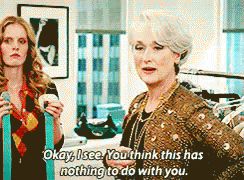
I don’t think I need to add anything since my thoughts should be pretty obvious, but let’s just say that, as expected, Kousuke really doesn’t understand Shin-Ae at all, and conflates his own desires and ideals with hers (or simply impose them on her, consciously or not).
Yet, I don’t think he completely believed what he said. Not that I care whether he’s an authentic jerk or not, but I think that, usually, Yeong-Gi confronting him about his flaws prompts him to become more verbally violent and exaggerate his statements in order to justify his behavior and not admit what he did wrong—so it must have something to do with his ego/pride, which, again, is far from being surprising.I don’t think what YG said will make him realize this; it actually made him angrier. I prefer Shin-Ae to tell him some home truths anyway, even if it might become even more difficult from now on.
Last but not least, I’m becoming reaaaally curious about YG and K’s childhood, because I have a hard time interpreting the “I’m not the same kid you deserted years ago” line and its relevance with what was happening here.
That’s it for now :)
43 notes
·
View notes